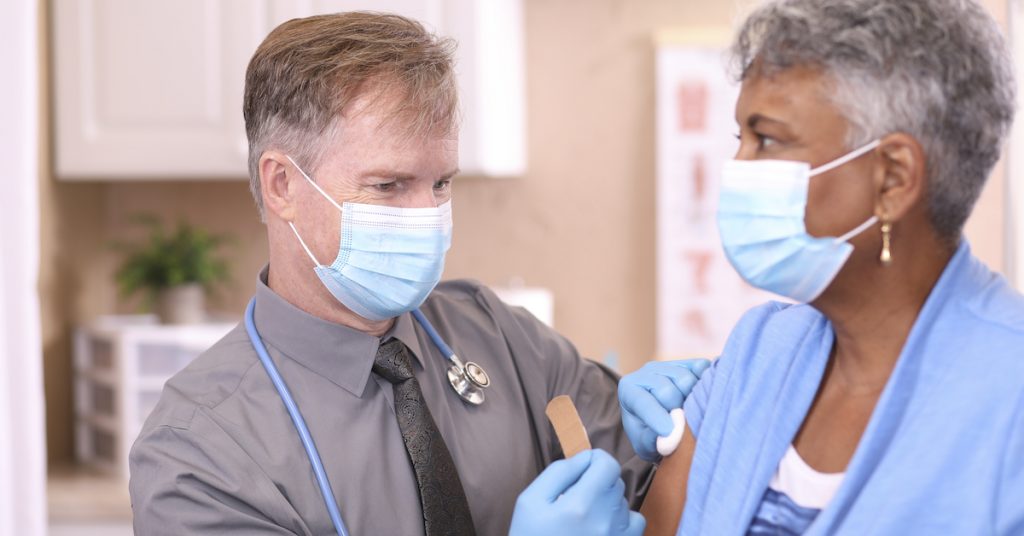
With two COVID-19 vaccines now available, confusion is at an all-time high. Are the vaccines safe? What are the side effects? Who is eligible? And how do I find a COVID-19 vaccine near me?
While FastMed does not currently carry COVID-19 vaccines, we are here to answer your questions and separate fact from fiction so you can make the best choice for yourself and your family.
How we got here
After millions of infections and deaths worldwide, the race to develop a COVID-19 vaccine was a critical one—but it’s important to acknowledge that scientists had a head start on this crisis. While it may seem like COVID-19 vaccines were developed and fast-tracked overnight, they are actually built upon decades of work to develop vaccines for similar viruses.
Because vaccines are given to millions of healthy people to prevent life-threatening diseases, the FDA holds them to extremely high safety standards—and COVID-19 vaccines are no exception. More than 70,000 Americans volunteered in clinical trials to prove that the vaccines on the market are safe and successfully prevent COVID-19 infection. To date, both vaccines are approximately 95% effective in preventing COVID-19 with no serious safety concerns.
So, how did the U.S. Food & Drug Administration (FDA) complete a process in a matter of months that typically takes years? The FDA was able to get the vaccines to people faster by using what is called an Emergency Use Authorization (EUA). Even after the FDA authorizes a vaccine, the data must still be reviewed by an independent advisory committee with the Centers for Disease Control and Prevention (CDC) before the vaccine can be recommended for use by the general public.
COVID-19 vaccine availability today
There currently are two COVID-19 vaccines on the market in the United States today, with others in development. COVID-19 vaccine availability is a high priority for health departments across the country as they strive to vaccinate as many people as possible.
Let’s explore the two vaccines approved by the FDA and CDC that are available today, Pfizer-BioNTech and Moderna. Both vaccines are a series of two injections that are given in the deltoid muscle (between the upper arm and shoulder). Both vaccines are approximately 95% effective with limited side effects. However, there are a few differences between the vaccines.
Pfizer-BioNTech
- Approved for age 16 and older
- 2-dose series separated by 21 days (3 weeks)
- Must be shipped and stored between –80⁰C and –60⁰C (–112⁰F and –76⁰F)
Moderna
- Approved for age 18 and older
- 2-dose series separated by 28 days (4 weeks)
- Must be shipped and stored between 2°C and 8°C (36°F and 46°F)
How these COVID-19 vaccines work
For starters, there is no COVID-19 virus in the vaccine. Both the Pfizer and Moderna vaccines use mRNA to give your body instructions to make a protein. This protein safely teaches your body to produce antibodies that fight the real COVID-19. Your body then naturally breaks down the protein from the vaccine. It does not alter any DNA in your body. Aside from a genetic code messenger called mRNA, the only other ingredients in the Pfizer and Moderna vaccines are salt, sugar, and fat.
COVID-19 vaccine side effects
Most COVID-19 vaccine side effects are temporary and are similar for both vaccines. These may include:
- Soreness at the injection site
- Tiredness
- Headache
- Muscle pain
- Joint pain
- Chills
- Fever
More people experience these side effects after the second dose than the first dose, and younger people are more likely to have reactions than older people. However, neither vaccine can give you COVID-19.
Healthcare providers are required to report any serious side effects through the Vaccine Adverse Events Reporting System (VAERS), which the FDA monitors for COVID-19 vaccine safety. The CDC also offers v-safe, a smartphone-based tool that uses text messaging and health surveys to do health check-ins after a person receives a COVID-19 vaccine. You can easily report any issues with your COVID-19 vaccine through the v-safe platform.
Am I eligible for a vaccine?
Because COVID-19 vaccine supplies are limited, the CDC has provided recommendations to federal, state, and local governments about who should be vaccinated first. However, each state has its own plan for deciding who will be vaccinated first and how they can receive their COVID-19 vaccines.
The CDC recommends that healthcare personnel and residents of long-term care facilities be given top priority for COVID-19 vaccines, followed by frontline essential workers and people aged 75 and older. The next groups are people aged 65–74, people aged 16–64 with underlying medical conditions, and other essential workers, such as transportation, food service, and public safety. This may vary by state.
To learn more about COVID-19 vaccine availability in communities where FastMed clinics are located, please visit the following state health departments: Arizona, North Carolina, or Texas.
COVID-19 vaccine appointments are in high demand, so be sure to check with your state directly.
Finding a COVID-19 vaccine near me
While FastMed does currently not offer the COVID-19 vaccine, we do offer a full range of COVID-19 testing, including diagnostic rapid tests and antibody tests, at all North Carolina, Arizona, and Texas clinics.
About FastMed
FastMed is a leading provider of high-quality, convenient, affordable, and compassionate healthcare in 34 counties across North Carolina. FastMed serves both urban and rural communities across the state with a wide range of care options, including preventive, telemedicine, occupational health, and primary and urgent care. FastMed is one of the few urgent care providers in the nation that has earned The Joint Commission’s coveted Gold Seal of Approval® for quality, safety, and infection control in ambulatory healthcare. For more information, visit www.fastmed.com.